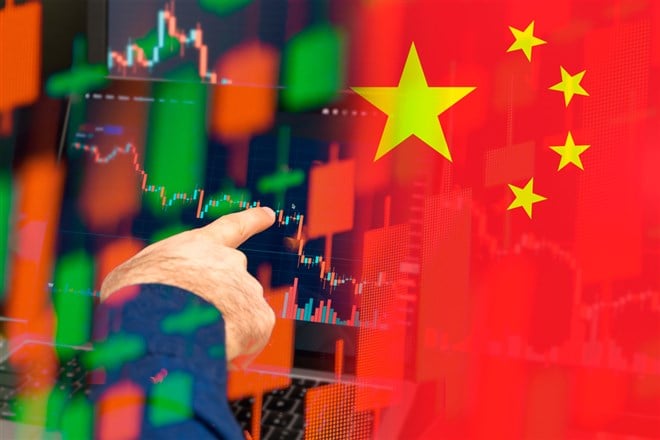PDD Holdings Deserves a Spot on Your Watchlist as China Reopens PDD Holdings may have overtaken some of its bigger international competitors positioning itself for a strong comeback in its unstoppable profitability path.
This story originally appeared on MarketBeat

Sheng Soncheng, former head of statistics analysis at the People's Bank of China, recently expressed his views and opinions on the likely outcome for the nation's GDP reading for 2023. Sheng clearly expressed that "chances are high China's government will meet or exceed its relatively modest economic growth target for this year, a former central bank official said, with a more stable property market helping to underpin the recovery."
Now, with a modest economic growth target, investors should beware that China has come off a decade of double-digit GDP growth. Targeting 5% - and with Sheng pointing to 5.6% - is now considered a modest and slow year. These recent views were likely in the works yet only announced recently as the Caixin manufacturing PMI index reached 54.2, its highest reading since 2020. Readings back above expansion, and no signs of slowing down any time soon, may very well kick China's GDP into the high-gear the PBOC and Sheng has put out.
Pinduoduo off the sidelines and into the field
PDD Holdings (NASDAQ: PDD) has been quietly expanding its operations in the Chinese and international markets since 2015, and only recently, in 2021, has it achieved profitability. Many thought this would be a fluke, but it turns out that PDD is here to stay and keep growing. Top-line revenues have grown at a 4-year average rate of above 50%, which is worthy of startup status growth for a company, yet PDD is far from the usual startup that has lots to prove itself.
The firm only became profitable after 2020, but once it did, there was no going back to the old days of lean operations and scrambling for cash flow and market share. Operating margins stood at 7.3% for 2021 and grew to an astonishing 28.6% as stated in their latest quarterly results. These formidable increases in margin can be attributed to a few factors that place the firm above the rest of its peers in the group.
PDD Holdings can credit its quick rise and adoption rates, for starters, to its inflated yet necessary marketing budget which can swing anywhere from 40% to 50% of the firm's revenue measured over a quarter or a whole fiscal year. Figures in the 2021 annual report point to a 50% increase in active users who come back for more, going from 585.2 million users in 2019 to 868.7 million users in 2021.
While there are no updates on the active user base as of 2022, investors can expect similar growth rates after the company's appearance during the 2022 Super Bowl.
All of these marketing expenses have come back reporting a high ROI, as can be noted by the massive user growth in such a short period of time, but what makes users stay and recommend further family and friends to use/purchase from the platform is pure innovative genius. They call it the "Team Purchase" option.
This incentive program lets users and their invitees (whether family, friends or even business associates) purchase a basket of products in bulk as a group and thus receive more favorable pricing. Most manufacturers and sellers in the platform require at least two active users in the team to pass on these price benefits, but of course, the more, the merrier, which has allowed PDD to have free word-of-mouth marketing by itself.
An underestimated opponent
JD.com (NASDAQ: JD) has plans for a $1.4 billion USD discount subsidy which will, in effect, create a price war between itself, PDD and even Alibaba Group (NYSE: BABA). Understanding that Alibaba has deep government relationships and more withstanding "dry powder" to scale their logistics to cater to any price war and that PDD holdings have deeply rooted relationships with its customers - especially in urban areas - it would still be a tough road ahead for JD if it were to initiate a conflict of that scale.
PDD has achieved amazing goodwill, and business acumen, by incorporating the farmers of urban China into their grocery delivery services. PDD offers a comprehensive training program to farmers in logistics, supply chain management, inventory control and a lot of other basic and advanced business practices to stimulate the space. In return, these farmers will choose PDD's grocery and basic products segment over the typical wholesalers, given the owed respect and relationship.
What PDD is achieving, intentionally or otherwise, is sort of the Walmart (NYSE: WMT) or Costco Wholesale (NASDAQ: COST) concept of passing benefits onto consumers via economies of scale and supplier preferential treatment.
Knowing how to make an entry
$95-$100 seems to be a strong resistance level in this stock, with an upward channel trend forming since March 2022 and bearish divergences in weekly RSI and Stochastic studies. This turns on a warning light for investors itching to press the button, it would be more sensible to wait for the bottom channel retest and the most proximal support level of $70-$72 where some studies may be further from the "overbought" areas, and perhaps a better Fibonacci retracement can be entered into.
Nonetheless, PDD Holdings deserves a spot on a watchlist that believes in the unprecedented bullish wave for the reopening Chinese consumer economy.








